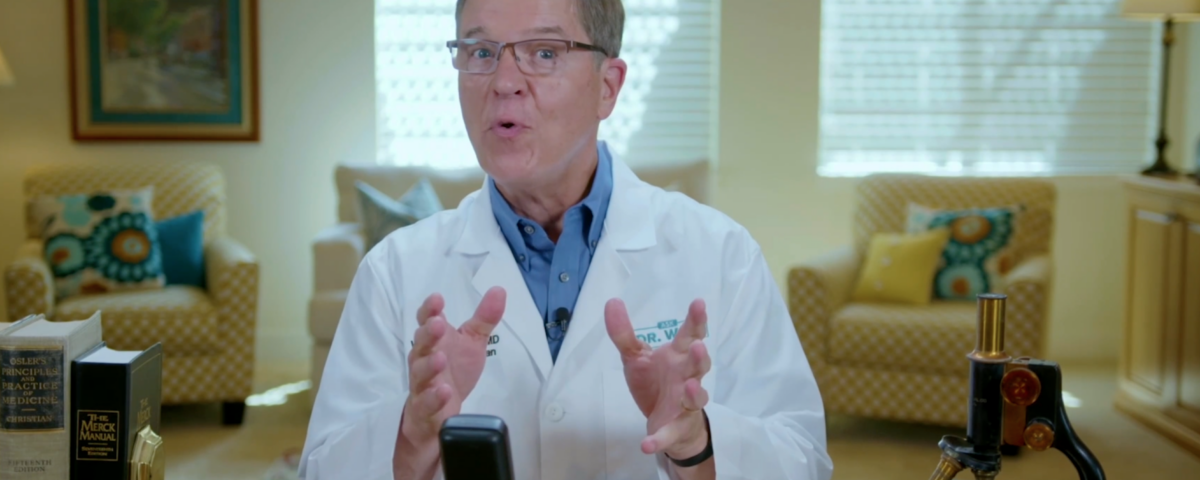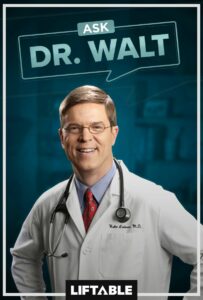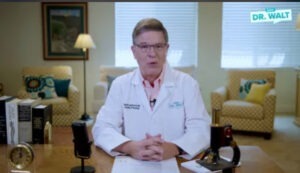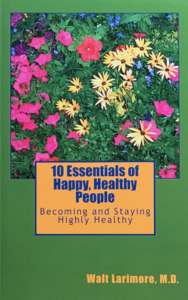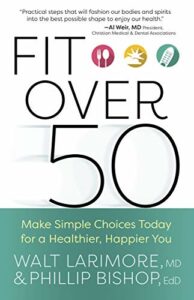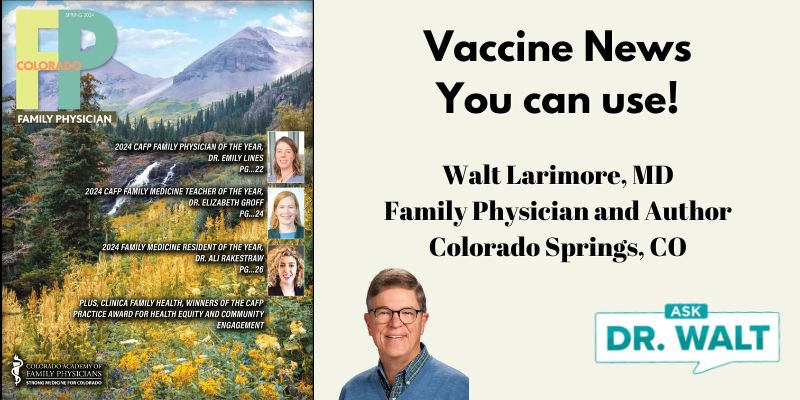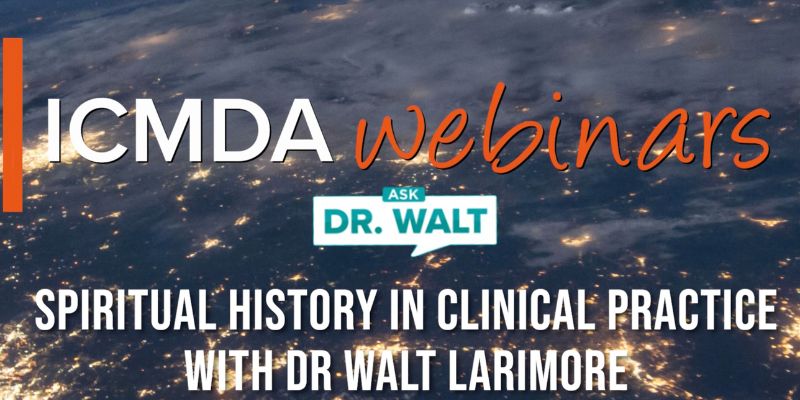Ask Dr. Walt 16 – Essential #9 – Be Your Own Health Care Quarterback OR The Essential of Personal Responsibility and Empowerment

Spiritual Interventions in Healthcare: Becoming an Everyday Missionary Wherever God Plants You!
August 18, 2023
9 Dogface soldiers inducted to Marne Hall of Fame — including my Dad
August 23, 2023Ask Dr. Walt 16 – Essential #9 – Be Your Own Health Care Quarterback OR The Essential of Personal Responsibility and Empowerment
Many of my patients tell me they feel baffled, even powerless, in the face of myriad healthcare options. They also seem confused over medical reporting in the media. As one patient told me, “One day they say a high-protein diet is healthy—and the next day they say it’s deadly. Who should I believe? Can’t you doctors ever get the story straight?” I’ll tell you how on today’s episode of Ask Dr. Walt.
From 2021-2022, I was honored to host a TV show on LiftableTV, “Ask Dr. Walt.” In this series, I’m explaining the 10 key habits or 10 essentials of happy, healthy people.
Many of my patients tell me they feel baffled, even powerless, in the face of myriad healthcare options. They also seem confused over medical reporting in the media. As one patient told me, “One day they say a high-protein diet is healthy—and the next day they say it’s deadly. Who should I believe? Can’t you doctors ever get the story straight?” I’ll tell you how on today’s episode of Ask Dr. Walt: Essential #9 – Be Your Own Health Care Quarterback OR The Essential of Personal Responsibility and Empowerment.
You can click below to watch a video of the show, or I’ve put the show transcript at the end of the blog if you’d prefer.
You can learn more about this topic in my best-selling book, 10 Essentials of Happy, Healthy People: Becoming and staying highly healthy or Fit over 50: Make Simple Choices for a Healthier, Happier You.
CLICK HERE FOR 10 E’S CLICK HERE FOR Fo50
Disclaimer: The Ask Dr. Walt show is designed for entertainment purposes to give information on various medical conditions, treatments, and procedures for your personal knowledge and to help you be a more informed consumer of medical and health services.
SHOW TRANSCRIPT
TEASE:
Many of my patients tell me they feel baffled, even powerless, in the face of myriad healthcare options. They also seem confused over medical reporting in the media. As one patient told me, “One day they say a high-protein diet is healthy—and the next day they say it’s deadly. Who should I believe? Can’t you doctors ever get the story straight?” I’ll tell you how on today’s episode of Ask Dr. Walt.
OPEN:
Hi, everyone. I’m family physician Dr. Walt Larimore and I’m pleased you are taking the time to join me in my home office as we continue our discussion about the ten essentials of becoming and staying healthy physically, emotionally/mentally, relationally, and spirituality. WE’VE ALREADY COVERED the essentials of:
- True health
- Self-care
- Reducing SADness
- Forgiveness
- Relationships
- Spiritual health
- Positive self-image, and
- Discovering your destiny
TODAY WE’LL COVER:
- The essential of personal responsibility and empowerment or how to be your own healthcare quarterback
IN OUR NEXT PROGRAM, THE LAST ONE OF THIS SERIES, I’LL COVER the essential of
- Teamwork in healthcare.
Let me tell you from the top of the program, the bottom line is that as long as you depend completely upon others for healthcare information, you’re going to be confused. The highly educated health professionals whose articles you read and whose shows you listen to or watch can have wildly differing opinions about everything from aloe to zinc, from acupressure to Zen, from Pap smears to cancer treatments.
On top of this is a veritable tidal wave of medical information that hits the public every day—from our morning news and the national magazines to the evening news, TV magazine shows, and radio reports—plus the massive amounts of information available on the internet, we’re literally bombarded with conflicting information from every direction. Unfortunately, the headlines seldom accurately convey the science.
I don’t know if you’re a sports fan but let me give you an analogy I’ve shared with my patients for years: You need to become your own healthcare quarterback. You’ll need a good primary care physician as your coach—someone who’s a medical expert and willing to listen to you, to coach and advise you—sometimes even to correct your thinking and push you to consider options you don’t even know about.
You may also need some specialists—assistant coaches. These coaches are trained in a specific aspect of the game. They know almost everything there is to know about the part of the body they’re in charge of, but they can’t see the entire game in the same way you and your coach can.
The best teams—the ones that win the most—have great quarterbacks working with great coaches. When it comes to your health, you need to learn how to call the plays. You must take charge of your healthcare and become your own healthcare quarterback.”
So, let’s take some of your questions and comments about becoming your own healthcare quarterback. Thanks to all of you who sent in your thoughts. I can’t answer them all, but I appreciate Kylie and Jordan helping me to sort through them and put them in order. At the end of this show, I’ll tell you how to send in your questions for our next show on how to build your healthcare team.
1) Our first comment comes from Joshua in Chicago. He writes, “Dr. Walt, I’m not qualified to sort through all the options myself and make a sound medical decision. I need an expert to inform me about the whole process and recommend the best treatment options. This is the doctor’s job, as far as I’m concerned, not mine!”
I totally agree! That’s exactly what your family physician should do as your healthcare coach—make recommendations and explain in clear terms the nature of your medical problem and your treatment options. The doctor should advise you on what is normally the best plan for your medical problem. Note, though, that I use the words recommendations and options. Your doctor needs to give you the information you need and let you make the final decision on what play to call.
2) Immanuel in Lancaster, Pennsylvania, asks, “What do I need to do to become my health quarterback. Do you suggest any playbooks for me to study?”
To become your own healthcare quarterback, I encourage you to do at least two things:
First, be proactive and take more responsibility than you have taken in the past. Knowledge is power. You should have as much information as possible about your condition—and your rights—so that you have the confidence to share in the decisions that affect your health, the quality of your life, and survival itself. The better prepared you are to ask informed questions, the better your chances of receiving optimum medical care.
Second, find a family physician to be your healthcare coach. You don’t want a healthcare coach who will overwhelm you with data, research conclusions, and divergent opinions—and then leave you with too much information to process. Look for someone who will guide you in exploring the best options regarding your healthcare and treatment, then recommend your best options—but will let you make your choice about the best selection for you.
3) Martha in Wichita, Kansas asks, “I can’t become a medical expert. Why even try?”
Martha, you’re not alone. Others had the same concern. To be clear, I am NOT saying that you must become a medical expert to have any hope of becoming highly healthy—of course not! I am saying that when you actively participate in your health care—in partnership with a family physician who encourages such teamwork—you are operating according to the best model of medicine, the one most likely to result in your achieving maximum health. That is why finding a terrific healthcare coach to inform and guide you should be your first move.
Instead of taking any more questions, let me take some time to teach you what I’ve taught my patients for four decades. Get out a pen and paper, because I want you to learn how to take charge of your health by becoming your and your family’s healthcare quarterback.
To anyone who wants to work successfully with their family physicians to make medically reliable and wise choices about their health, I recommend my GUEST acrostic to increase your skills as a healthcare quarterback:
- G: Get the facts
- U: Understand the layers of healthcare
- E: Explore all treatment options
- S: Seek wise spiritual counsel
- T: Take a personal inventory
The first step of the GUEST acrostic is the “G” or “Get the Facts”
Always begin your journey to health by asking your healthcare professional for a thorough summary of the issue at hand. Here are several questions to consider asking whenever you’re facing a new diagnosis:
- What is my diagnosis?
- How certain are you that this diagnosis is correct?
- Could this be any other disease or condition besides the one being considered?
- What are the causes of my condition?
- What other symptoms might be seen?
- What tests or assessments are recommended? What will they cost? Will they be covered by insurance?
- Where can I learn more about this disorder? Are there any internet sites you recommend? Are there any resources you would recommend? Do you have any patient education materials you could give me?
- Do you have other patients with the same condition who can contact me and share what they’ve learned and experienced?
If your appointment time with your healthcare professional is too short to discuss these items, reschedule a longer appointment to discuss your concerns. Bring a list of all your questions. Also consider bringing your spouse or a trusted friend to listen, take notes, and ask questions.
If your healthcare professional can’t or won’t spend the time with you that you desire, seek the opinion of one who will. This is your right and responsibility. For recommended tests or referrals, call your insurance company if you are unsure about what’s covered.
Double-check everything you hear and learn. You should be able to find documentation from several sources. If the sources conflict, ask your family physician to help you sort out the contradictions.
For more difficult symptoms or diagnoses, don’t hesitate to request or even insist upon a second opinion—especially when the disease or treatment plan is controversial, uncertain, or can be life- or body-changing.
And, if those two opinions differ, seek a third opinion. Your emphasis should be on gathering useful and reliable information. It’s your job to become educated about your disease or disorder.
The second step of the GUEST acrostic is the “U” or “Understand the Different Layers of Healthcare”
You can gain care and information from several levels of the healthcare system.
Primary Care is the first and most basic level of medical care. Family physicians, pediatricians, primary care internists, and geriatricians most commonly provide primary care. Many will have midlevel professionals or physician extenders working alongside them. Physician assistants (PAs), certified nurse midwives, and nurse practitioners can all help provide primary care and assist you in coordinating any specialists, tests, or procedures you might need. I’ll call these primary care professionals PCPs and all are generalists who are trained to diagnose and treat more than 90 percent of the problems you have.
Joel E. Yeager, MD, writes, “US adults who have a primary care physician have 33 percent lower health care costs and 19 percent lower odds of dying than those who see only a specialist. As a nation, we would save $67 billion each year if everybody used a primary care provider as their usual source of care.”[i]
A 2019 study published in JAMA Internal Medicine found parts of the US with more PCPs had lower mortality rates and increased life expectancy than those with fewer PCPs—irrespective of how many specialists were in the area.[ii]
For most patients, the best choice for a healthcare coach and advocate will be a primary care professional. You’ll be the quarterback of your healthcare team. You call the plays. But you need a great PCP to be your coach.
Secondary Care
The secondary-care level consists of physicians also called limited-care specialists. They may care for acute conditions that cannot be treated in an outpatient setting due to the severity of the illness, such as emergency or urgent care professionals. They may care for a single organ system or gender. For example, neurologists care for problems of the brain, spinal cord, and nerves, while obstetrician-gynecologists care for women’s problems. Specialists are highly trained to care for problems, but only in their area of expertise. For some patients, because of their health problem, their best choice for a healthcare coach or advocate is a specialist. Examples might include a cancer patient’s oncologist, a heart patient’s cardiologist, or a senior citizen’s geriatrician. But most of these limited-care specialists are delighted to assist your PCP in caring for you.
Tertiary Care
The third level of healthcare is for those problems that occur rarely or those cases that are very complex. This care is most commonly available at large medical centers many of which are also associated with medical schools, research centers, or residency training programs. These centers care for the sickest of the sick. Whereas a primary care physician might see one case of a particular disease in years of practice, a tertiary care physician may treat many each year. They often conduct research and are usually up to date with the newest treatments, as well as experimental treatments.
Quaternary Care
The fourth and most advanced level of care is even more specialized. It’s usually provided in what is called at the National Institutes of Health or what is called a Center of Excellence. Verywellhealth.com contributor Trisha Torrey says, “Because it is so specific, not every hospital or medical center offers quaternary care. The types of care that might be considered to be quaternary would be experimental medicine and procedures as well as highly uncommon and specialized surgeries.”[iii]
Let’s get back to our GUEST acrostic. The third step is the “E” or “Explore Treatment Options”
Whenever possible, obtain complete information on the risks, benefits, and costs of each treatment option recommend to you. Ask every healthcare professional you see, “What are all the potential treatments available to me, and how do you suggest we analyze them to come up with my best treatment option?”
Ask how your condition can be expected to progress with each treatment—and without treatment. Even for the most recommended options, ask the professional, “Will you discuss with me all the possible risks and benefits of what you are recommending? What will they cost? Of these costs, how much will I need to pay?”
Some healthcare professionals aren’t used to caring for people who are their own healthcare quarterbacks. Some may seem bothered by these kinds of discussions. If your doctor seems bothered or distracted, consider saying, “Would there be a better time to schedule with you to discuss my concerns?”
I had another friend who once asked several questions of a urologist who was treating him for a prostate problem. The urologist replied, “I don’t have time for your questions.” That was my friend’s last visit to that doctor.
When another of my friends asked a question like this of her doctor, she was told, “I’m not sure I have the time for this type of thing.” She calmly replied, “No problem. Can you suggest another doctor who does?” Her doctor smiled. He got the point. From then on, he made time for her. But if he hadn’t, she was prepared to go elsewhere to obtain the healthcare information she needed.
The fourth step of the GUEST acrostic is the “S” or “Seek Wise Spiritual Counsel”
Does this step surprise you? It certainly surprises many of my patients. Yet, spiritual guidance and counsel, especially if you’re facing a life-threatening situation, is a critical component of your healthcare. The Bible teaches, “Is anyone among you sick? Let them call the elders of the church to pray over them and anoint them with oil in the name of the Lord. And the prayer offered in faith will make the sick person well; the Lord will raise them up. If they have sinned, they will be forgiven” (James 5:14-15).
Pastors, priests, elders, deacons, and other spiritual professionals such as parish nurses, Christian and pastoral counselors are also obvious selections for spiritual care.
If you are not active in a faith community but desire spiritual guidance, consider calling your local hospital to see if there’s a chaplain on staff. Hospital chaplains are delighted to assist you as you seek wisdom and comfort during a medical dilemma or crisis.
In addition, in most communities, Christian lay ministers are trained by the Order of St. Luke[iv] or the Stephen Ministries[v] to minister to the spiritual health needs of others.
These spiritual counselors may ask you challenging questions about your spiritual health. But they are usually able to give you wise counsel and certainly will be able to pray with and for you. They may also be able to put you in contact with others who have wrestled with the same problems.
The fifth and final step of the GUEST acrostic is the “T” or “Take a Personal Inventory”
Begin a personal inventory—in writing—about your healthcare needs. Take quiet time to think, meditate, pray, and journal. Don’t just record the facts you’re discovering. Record what others are telling you as well. Record how you feel about your medical, emotional, relational, and spiritual challenges. Be honest. This journal is for no one’s eyes but yours.
As part of your inventory, consider what your own intuition is telling you about your medical problems. If you had no fear of any consequences, what would you do? If money were no object, what would you do? What do you sense God is leading you to do or not do?
Write out your prayers and spend plenty of time listening to the answers that come to you through your own spiritual ears, through the wise guidance of others, and through the circumstances that unfold. Record all answers that emerge from your time of prayer.
Finally, write about the support you feel you need, both now and throughout your treatment. What support is already available to you? How can you find the support you need?
In review, the GUEST acrostic will help you make your own healthcare choices and get you on the path of making well-informed healthcare decisions.
- G: Get the facts
- U: Understand the layers of healthcare
- E: Explore all treatment options
- S: Seek wise spiritual counsel
- T: Take a personal inventory
Following the GUEST steps can assist you in making wise healthcare decisions that are fully informed, spiritually sound, and satisfying. But remember, after all the learning, prayer, and reflection, your final decision will involve a step of faith.
It’s important to add a caveat. Patients sometimes think that following this process somehow guarantees good results. It does not, but it can distinctly improve your chances for the best possible outcome.
Well, our time’s up for today. To continue your journey to becoming an extraordinarily healthy person, I hope you will fill some of this program’s prescriptions for health. If you want more information on this health essential, you may be interested in two of my best-selling books: Fit over 50: Make Simple Choices for a Healthier, Happier You, and 10 Essentials of Happy, Healthy People: Becoming and staying highly healthy. You can find them at DrWalt.com. Just click on the tab that says books.
Also, at DrWalt.com you can sign up for both my daily “Medical News You Can Use” blog and my twice-daily Biblical devotion, “Morning Glory, Evening Grace.”
We’ve now completed nine of our ten programs on the essentials of highly healthy people. In our next program, we’ll talk about building your healthcare team. I’d love to hear from you. What questions do you have about your healthcare team? Just send an email to me at DrWalt@Liftable.TV along with any other general health questions you might have. That’s DrWalt@Liftable.TV.
So, until our next visit, “Dear friend, I pray that you may enjoy good health and that all may go well with you, even as your soul is getting along well.” I’m Dr. Walt Larimore and I look forward to seeing you for my next episode of “Ask Dr. Walt.”
[i] Joel E. Yeager, MD, Transforming Healthcare Together: A Model for Restoring the Covenant of Trust (Pennsauken, NJ, BookBaby: 2018).
[ii] tinyurl.com/yyrfvrk8
[iii] tinyurl.com/y3wa5ggf
[iv] Order of St. Luke (tinyurl.com/y9t5bvcq). The International Order of St. Luke the Physician is a Christian healing ministry and fellowship of (1) professional people in all phases of medical work; (2) clergy in the ministry of the Roman, Orthodox, Anglican, and Protestant churches; and (3) laypeople from all walks of life who believe that the healing ministry of Jesus Christ belongs in the church today. The order is the outgrowth of the Fellowship of Saint Luke, begun in 1932 by the late John Gayner Banks, S.T.D., priest of the Episcopal Church, and his wife, Ethel Tulloch Banks.
[v] Stephen Ministry (tinyurl.com/cg6djuq). For more than 25 years, Stephen Ministries has been serving thousands of congregations from more than one hundred denominations with biblical, Christ-centered training and resources for one-to-one lay care giving, small groups, and spiritual growth, and healing.
Disclaimer: The “Ask Dr. Walt” show is designed for entertainment purposes to give information on various medical conditions, treatments, and procedures for your personal knowledge and to help you be a more informed consumer of medical and health services.
© Copyright WLL, INC. 2023. This blog provides healthcare tips and advice that you can trust about a wide variety of general health information only and is not intended to be a substitute for professional medical advice, diagnosis, or treatment from your regular physician. If you are concerned about your health, take what you learn from this blog and meet with your personal doctor to discuss your concerns.

